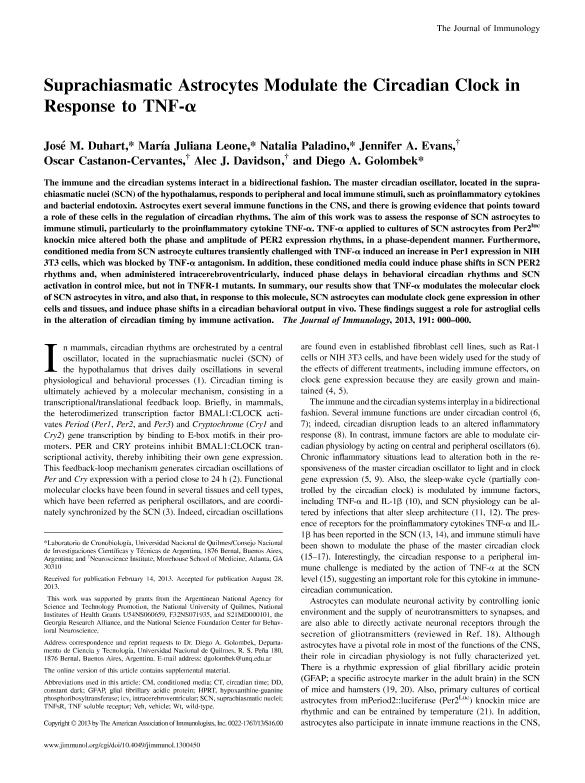Artículo
SCN astrocytes modulate the circadian clock in response to TNF-α
Duhart, José Manuel ; Leone, Maria Juliana
; Leone, Maria Juliana ; Paladino, Natalia
; Paladino, Natalia ; Evans, Jennifer A.; Castanon Cervantes, Oscar; Davidson, Alec J.; Golombek, Diego Andrés
; Evans, Jennifer A.; Castanon Cervantes, Oscar; Davidson, Alec J.; Golombek, Diego Andrés
 ; Leone, Maria Juliana
; Leone, Maria Juliana ; Paladino, Natalia
; Paladino, Natalia ; Evans, Jennifer A.; Castanon Cervantes, Oscar; Davidson, Alec J.; Golombek, Diego Andrés
; Evans, Jennifer A.; Castanon Cervantes, Oscar; Davidson, Alec J.; Golombek, Diego Andrés
Fecha de publicación:
11/2013
Editorial:
American Association of Immunologists
Revista:
Journal of Immunology
ISSN:
0022-1767
Idioma:
Inglés
Tipo de recurso:
Artículo publicado
Clasificación temática:
Resumen
The immune and the circadian systems interact in a bidirectional fashion. The master circadian oscillator, located in the suprachiasmatic nuclei of the hypothalamus (SCN), responds to peripheral and local immune stimuli, such as proinflammatory cytokines and bacterial endotoxin. Astrocytes exert several immune functions in the central nervous system and there is growing evidence that points towards a role of these cells in the regulation of circadian rhythms. The aim of this work was to assess the response of SCN astrocytes to immune stimuli, particularly to the proinflammatory cytokine TNF-α. TNF-α applied to cultures of SCN astrocytes from Per2luc knock in mice altered both the phase and amplitude of PER2 expression rhythms, in a phase dependent manner. Furthermore, conditioned media from SCN astrocytes cultures transiently challenged with TNF-α induced an increase in Per1 expression in NIH 3T3 cells, that was blocked by TNF-α antagonism. In addition, these conditioned media could induce phase shifts in SCN PER2 rhythms and, when administered intracerebroventricularly, induced phase delays in behavioral circadian rhythms and SCN activation in control mice, but not in TNF-Receptor-1 mutants. In summary, our results show that TNF-α modulates the molecular clock of SCN astrocytes in vitro and also that, in response to this molecule, SCN astrocytes can modulate clock gene expression in other cells and tissues, and induce phase shifts in a circadian behavioral output in vivo. These findings suggest a role for astroglial cells in the alteration of circadian timing by immune activation.
Palabras clave:
Cytokines
Archivos asociados
Licencia
Identificadores
Colecciones
Articulos(SEDE CENTRAL)
Articulos de SEDE CENTRAL
Articulos de SEDE CENTRAL
Citación
Duhart, José Manuel; Leone, Maria Juliana; Paladino, Natalia; Evans, Jennifer A.; Castanon Cervantes, Oscar; et al.; SCN astrocytes modulate the circadian clock in response to TNF-α; American Association of Immunologists; Journal of Immunology; 191; 9; 11-2013; 4656-4664
Compartir
Altmétricas



